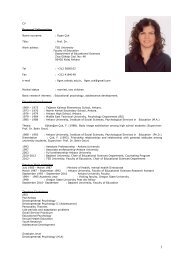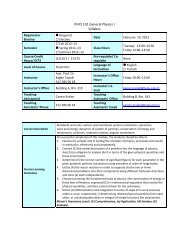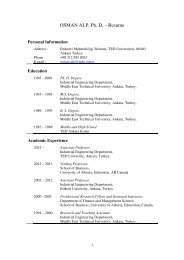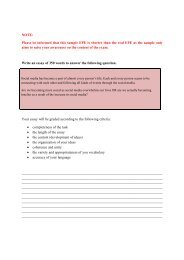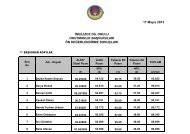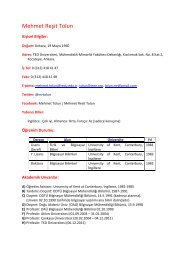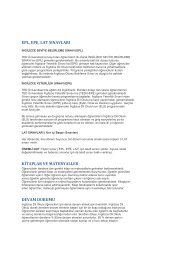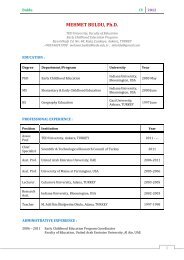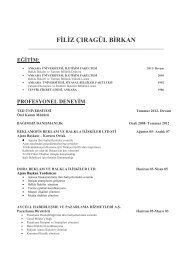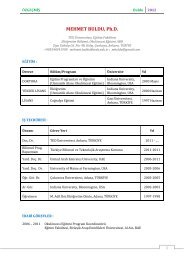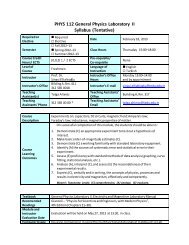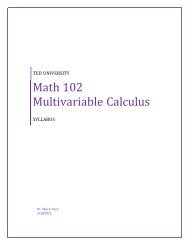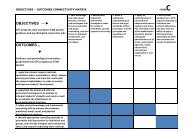HUM 101 2. Course Title: World History I 3. Type of course: Elective ...
HUM 101 2. Course Title: World History I 3. Type of course: Elective ...
HUM 101 2. Course Title: World History I 3. Type of course: Elective ...
- No tags were found...
You also want an ePaper? Increase the reach of your titles
YUMPU automatically turns print PDFs into web optimized ePapers that Google loves.
<strong>HUM</strong> <strong>101</strong><br />
1. <strong>Course</strong> Code and Number: <strong>HUM</strong> <strong>101</strong><br />
<strong>2.</strong> <strong>Course</strong> <strong>Title</strong>: <strong>World</strong> <strong>History</strong> I<br />
<strong>3.</strong> <strong>Type</strong> <strong>of</strong> <strong>course</strong>: <strong>Elective</strong><br />
4. Prerequisites and co-requisites: None<br />
5. Catalog Description<br />
An introductory coverage <strong>of</strong> the main events and civilizations in world history.<br />
Mesopotamia. Sumerians. Ancient Egypt. Impact <strong>of</strong> Greek Civilization. Rise and Fall<br />
<strong>of</strong> Rome. Christianity and the Dark Middle Ages. The Rise <strong>of</strong> Islam and the Crusades.<br />
6. Required and Recommended Reading:<br />
Required Textbook:<br />
Albert M. Craig, William A. Graham, Donald Kagan, Steven M. Ozment, Frank M.<br />
Turner, The Heritage <strong>of</strong> <strong>World</strong> Civilizations, Brief Edition, Combined Volume, 5/E,<br />
2012<br />
7. <strong>Course</strong> Structure/ECTS: ((3+0+0) 3 / 5 ECTS)<br />
8. <strong>Course</strong> Objective:<br />
The aim <strong>of</strong> the <strong>course</strong> is to deal with the historical evolution <strong>of</strong> humanity from the first<br />
civilizations up to 1850. The <strong>course</strong> aims to develop a particular consciousness about<br />
human history in terms <strong>of</strong> the development and transformation <strong>of</strong> civilizations,<br />
economic systems, technological inventions, gender, social changes, cultural<br />
productions and political developments.<br />
9. Extended <strong>Course</strong> Description:<br />
Schedule Topic<br />
Assignment<br />
Week 1<br />
Introduction<br />
Part 1<br />
Human Origins and Early Civilizations to 500 B.C.E.<br />
Chapter 1: The Birth <strong>of</strong> Civilization Chapter 1<br />
Week 2<br />
Chapter 2: Four Great Revolutions in Thought and Religion<br />
Part 2<br />
Empires and Cultures <strong>of</strong> the Ancient <strong>World</strong>, 1000 B.C.E. to<br />
500 B.C.E.<br />
Chapter 3: Greek and Hellenistic Civilization<br />
Chapter 2<br />
Chapter 3
Week 3 Chapter 4:<br />
West Asia, Inner Asia, and South Asia to 1000 C.E.<br />
Week 4 Chapter 5:<br />
Africa: Early <strong>History</strong> to 1000 C.E.<br />
Chapter 6:<br />
Republican and Imperial Rome<br />
Week 5 Chapter 7:<br />
China’s First Empire, 221 B.C.E. – 589 C.E.<br />
Chapter 4<br />
Chapter 5<br />
Chapter 6<br />
Chapter 7<br />
Week 6 Part 3:<br />
Consolidation and Interaction <strong>of</strong> <strong>World</strong> Civilizations, 500 to<br />
1500 C.E.<br />
Chapter 8:<br />
Imperial China, 589-1368<br />
Chapter 9:<br />
Early Japanese <strong>History</strong><br />
Week 7 Chapter 10:<br />
The Formation <strong>of</strong> Islamic Civilization, 622 – 1000<br />
Week 8 Chapter 11:<br />
The Byzantine Empire and Western Europe to 1000<br />
Chapter 12:<br />
The Islamic <strong>World</strong>, 1000 – 1500<br />
Week 9 Chapter 13:<br />
Ancient Civilizations <strong>of</strong> the Americas<br />
Week 10 Chapter 14:<br />
Africa, ca. 1000 – 1700<br />
Chapter 15:<br />
Europe to the Early 1500s: Revival, Decline, and<br />
Renaissance<br />
Chapter 8<br />
Chapter 9<br />
Chapter 10<br />
Chapter 11<br />
Chapter 12<br />
Chapter 13<br />
Chapter 14<br />
Chapter 15<br />
Week 11 Part 4:<br />
The <strong>World</strong> in Transition, 1500 to 1850<br />
Chapter 16:<br />
Europe 1500 – 1650: Expansion, Reformation, and Religious<br />
Wars<br />
Week 12 Chapter 17:<br />
Conquest and Exploitation: The Development <strong>of</strong> the<br />
Chapter 16<br />
Chapter 17
Transatlantic Economy<br />
Chapter 18:<br />
East Asia in the Late Traditional Era<br />
Week 13 Chapter 19:<br />
State Building and Society in Early Modern Europe<br />
Week 14 Chapter 20:<br />
The Last Great Islamic Empires, 1500 – 1800<br />
Chapter 18<br />
Chapter 19<br />
Chapter 20<br />
Week 15 Presentations<br />
10. Design Content: None<br />
11. Computer Usage: MS Office<br />
1<strong>2.</strong> Learning Outcomes <strong>of</strong> the <strong>Course</strong>:<br />
After completing this <strong>course</strong>, students will be able to<br />
• Develop a particular consciousness about human history in terms <strong>of</strong> the development<br />
and transformation <strong>of</strong> civilizations, economic systems, technological inventions,<br />
cultural productions and political developments. [1, 4, 6, 8]<br />
• Gain a particular insight about what “human” and “humanity” is. [1, 4]<br />
• Refer to history for thinking and even finding effective solutions to contemporary<br />
problems [2, 3, 6, 7]<br />
• Develop particular reasoning by making historical comparisons [6, 7, 8]<br />
• Develop complex argumentation skills in speech and writing. [6, 8]<br />
1<strong>3.</strong> Planned Learning Activities and Teaching Methods:<br />
Telling/Explaining<br />
Discussions/Debates<br />
Questioning<br />
Reading<br />
Demonstrating<br />
Simulations & Games<br />
Video Presentations<br />
Oral Presentations/Reports<br />
Web Searching<br />
14. Assessment Methods and Criteria:<br />
Active in-Class Participation 20 %<br />
Review about 5 News Articles 15 %<br />
Presentation <strong>of</strong> Review 5 %<br />
Research Paper about Day-<br />
Field Trip to Ankara 15 %<br />
Presentation <strong>of</strong> Field Trip 5 %<br />
1 Mid-term Examination 15 %
1 Final Examination 25 %<br />
15. Student Workload:<br />
Lectures<br />
<strong>Course</strong> Readings<br />
Exams/Quizzes<br />
Assignments/Research/Case Study<br />
TOTAL<br />
42 hrs<br />
32 hrs<br />
38 hrs<br />
38 hrs<br />
150 hrs<br />
16. Level <strong>of</strong> <strong>Course</strong>: BA<br />
17. Semester when the <strong>Course</strong> is Delivered: 1<br />
18. Mode <strong>of</strong> Delivery: face-to-face<br />
19. Language <strong>of</strong> instruction: English<br />
20. Prepared by: Assoc. Pr<strong>of</strong>. Dr. Zuhal Yeşilyurt Gündüz<br />
Faculty <strong>of</strong> Economic and Administrative Studies<br />
Department <strong>of</strong> International Relations<br />
Phone: 0312 – 585 00 32<br />
Fax: 0312 – 418 41 48<br />
E-mail: zuhal.gunduz@tedu.edu.tr<br />
21. Revision date: September 20, 2012<br />
Students’ Assignments:<br />
Active in-Class Participation<br />
• Read the given chapters before coming to class<br />
• Participate in discussions and debates lively<br />
• Do your quizzes<br />
• Make connections between your daily life and world history<br />
Review about 5 News Articles<br />
• Find and read reports and articles about history and historical events until the 19th<br />
century<br />
• Your chosen journals and newspapers can be English, German and / or Turkish<br />
ones, feel free to use the internet<br />
• For your review you need to answer the following questions:<br />
o Provide a full citation – name <strong>of</strong> author, newspaper or journal, date <strong>of</strong><br />
publication, title, etc.<br />
o What is described in the news article<br />
o Do you consider this event important If so, why If not, why<br />
o Does this article change your way <strong>of</strong> looking at historical events If so,<br />
how much If not, why not<br />
o Would you recommend others to read this article Why Why not
• You have to hand-over your review in time. Othervise your review will not be<br />
accepted, which means you will receive no points at all (= 0 points) for this<br />
assingment<br />
• Deadline: 27 November 2012, 10th week <strong>of</strong> class<br />
Presentation <strong>of</strong> Review<br />
•<br />
Research Paper about Day-<br />
Field Trip to Ankara<br />
Presentation <strong>of</strong> Field Trip<br />
1 Mid-term Examination<br />
1 Final Examination



